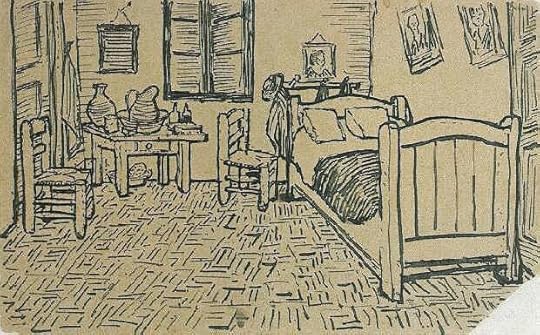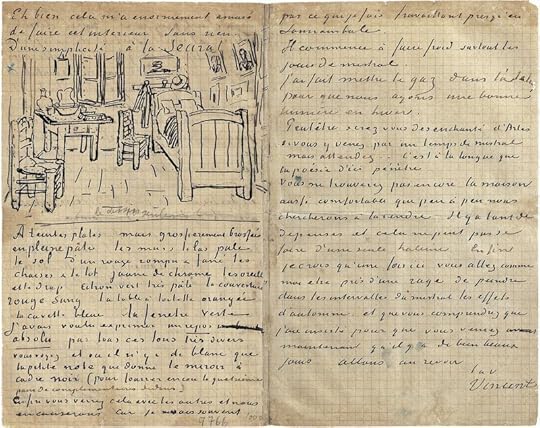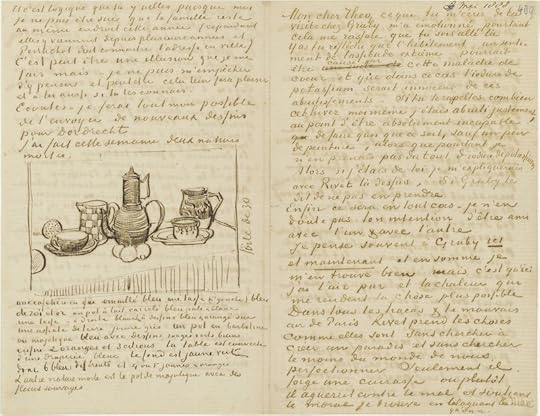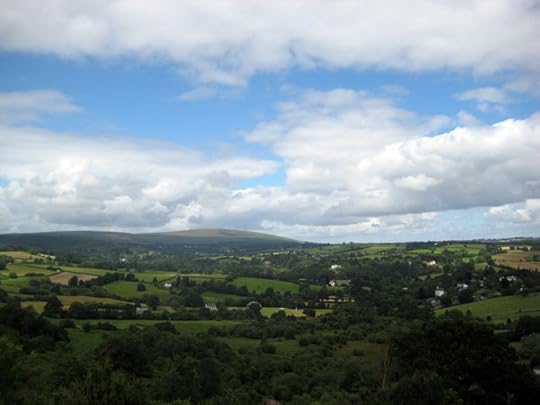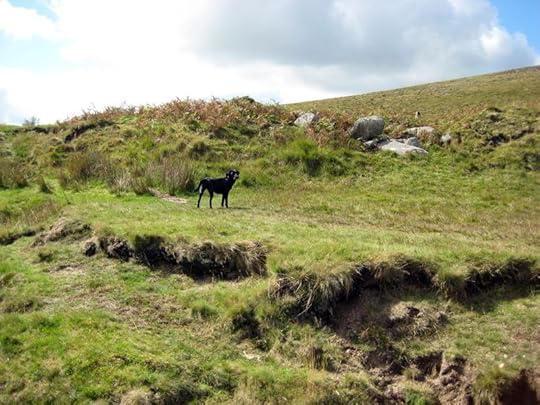Terri Windling's Blog, page 214
August 6, 2012
The creative impulse
“When Van Gogh was a young man in his early twenties, he was in London studying to be a clergyman. He had no thought of being an artist at all. He sat in his cheap little room writing a letter to his younger brother in Holland, whom he loved very much. He looked out his window at a watery twilight, a thin lampost, a star, and he said in his letter something like this: 'It is so beautiful I must show you how it looks.' And then on his cheap ruled note paper, he made the most beautiful, tender, little drawing of it.
"When I read this letter of Van Gogh's it comforted me very much and seemed to throw a clear light on the whole road of Art. Before, I thought that to produce a work of painting or literature, you scowled and thought long and ponderously and weighed everything solemnly and learned everything that all artists had ever done aforetime, and what their influences and schools were, and you were extremely careful about design and balance and getting interesting planes into your painting, and avoided, with the most astringent severity, showing the faintest academical tendency, and were strictly modern. And so on and so on.
"But the moment I read Van Gogh's letter I knew what art was, and the creative impulse. It is a feeling of love and enthusiasm for something, and in a direct, simple, passionate and true way, you try to show this beauty in things to others, by drawing it. And Van Gogh's little drawing on the cheap note paper was a work of art because he loved the sky and the frail lamppost against it so seriously that he made the drawing with the most exquisite conscientiousness and care. ”
- Brenda Ueland (from If Want to Write: A Book about Art, Independence and Spirit)
"Fiercely intelligent, yet bearing a sensibility far more porous than most, Van Gogh was unable, or unwilling, to abstract his intellect from his body's reality, unwilling to abandon the myriad things, to tame his senses and so stifle the steady eros between his flesh and the flesh of the earth.
"Again and again he slides out of himself, through his eyes, to feel the hunkard silence of the olive groves, and to taste the spreading ecstasy of the leaves as they're slowly lit by the climbing sun. And again and again he is invaded, in turn, by the visible -- penetrated by the midday langor of the rolling wheat fields, or by the sullen mood of a neighbor's face. Although he writes often to his brother and a few friends (letters of luminous candor and kindness), it is only in the act of drawing and painting that he is able to give expression to this ongoing intercourse, by offering back to the visible a trace of what the visible steadily pours into his chest.
"His paintings, then, are windows through which we look onto an earth no less alive and intelligent than ourselves."
- David Abram (from Becoming Animal)
“It is good to love many things, for therein lies the true strength, and whosoever loves much performs much, and can accomplish much, and what is done in love is well done.” - Vincent Van Gogh
You can see more more of his letter sketches, and read excerpts from his letters, in this 2009 post on the BiblioOdyssey blog (via Midori Snyder).
August 5, 2012
Tunes for a Monday Morning
I'm starting this week tired to the bone, so here are a trio of tunes to get the energy flowing...
Above, "Les Hommes que j'aime" from La Rou Kétanou: three musicians out of the Théâtre du fil in Paris who mix French chason with elements of folk, gypsy jazz, reggae, and a bit of poetry thrown in for good measure.
Next, the Parisian electro-swing band Caravan Palace, with a modern take on Cab Calloway's "Minnie the Moocher."
And finally, "The Penniless Optimist" from The Electric Swing Circus. This English electro-swing band out of Birmingham mixes '20s-style swing with gypsy jazz, breakbeat, house, dubstep, and circus performance.
Enjoy.
Recommended reading:
Jaimie James discusses the poetry of William Butler Yeats in relationship to his practice of magic in "W.B. Yeats, Magus" (Lapham's Quaterly).
"Magic," he writes, "imbrued Yeats’ thinking so profoundly that it’s nearly impossible to disentangle the strands without rending the garment. Kathleen Raine, a poet deeply influenced by Yeats, offered a useful formula: 'For Yeats magic was not so much a kind of poetry as poetry a kind of magic, and the object of both alike was evocation of energies and knowledge from beyond normal consciousness.” The salient word there is “evocation,” casting the poet as a magus conjuring verbal spirits, not from his imagination but from a higher, or a deeper, place.'"
Art above: A detail from "The Alchemist" by Edmund Dulac (1882-1953)
August 4, 2012
“This is the time for every artist in every genre to do...
“This is the time for every artist in every genre to do what he or she does loudly and consistently. It doesn't matter to me what your position is. You've got to keep asserting the complexity and the originality of life, and the multiplicity of it, and the facets of it. This is about being a complex human being in the world, not about finding a villain. This is no time for anything else than the best that you've got.” ― Toni Morrison
This is the time.
August 2, 2012
Art's central magic
“The compelling thing about making art — or making anything, I suppose — is the moment when the vaporous, insubstantial idea becomes a solid there, a thing, a substance in a world of substances. Circe, Nimbue, Artemis, Athena, all the old sorceresses: they must have known the feeling as they transformed mere men into fabulous creatures, stole the secrets of the magicians, disposed armies: ah, look, there it is, the new thing. Call it a swine, a war, a laurel tree. Call it art.” - Audrey Niffenegger
“The artist brings something into the world that didn't exist before, and that he does it without destroying something else. A kind of refutation of the conservation of matter. That still seems to me its central magic, its core of joy." - John Updike
Art above, by John William Waterhouse (1848-1917): "Circe"; sketches that Waterhouse made in books of poetry by Shelley and Tennyson; a sketch from the V & A collection; and "Circe Offering the Cup."
The journey through August
As regular readers of this blog are aware, my family and I have been dealing with some heavy Life Stuff this past year -- some of which resolved, blessedly, back in April; some of which is still unfolding. We're going through another tricky patch right now, and my office time will be limited this month. I'm going to try to keep this blog going nonetheless...but please forgive me if I don't always respond to comments in the next few weeks. Rest assured that I'll be reading them. I truly appreciate the conversation (with me and between yourselves) that goes on in the comments section, along with the poems and quotes and links you bring here; and I'll join in whenever Life Stuff allows.
August 1, 2012
On artistic inspiration, once again
"It seems to me that those songs that have been any good, I have nothing much to do with the writing of them. The words have just crawled down my sleeve and come out on the page."
- Joan Baez
"I never plan. I never know what the next page is going to be..... But that’s the fun of writing a novel or a story, because I don’t know what’s going to happen next." - Haruki Murakami
“A poem begins as a lump in the throat, a sense of wrong, a homesickness, a lovesickness.” - Robert Frost
"Poetry is what happens when nothing else can.” - Charles Bukowski
“I dropped my hoe and ran into the house and started to write this poem, 'End of Summer.’ It began as a celebration of wild geese. Eventually the geese flew out of the poem, but I like to think they left behind the sound of their beating wings.” - Stanley Kunitz
"When the poem arrives at your door, begin to dance immediately. Don’t hesitate; don’t offer a cup of tea; don’t ask how the journey was. That’s for prose. Take the poem in your arms and dance to the music that only you can hear.
"This is the amazing thing: The poem knows the steps."
- Tom Hirons (from his lovely blog post, 'On Wooing the Poem. A Beginner's Guide)
July 31, 2012
On stories
"This earth that we live on is full of stories in the same way that, for a fish, the ocean is full of ocean. Some people say when we are born we’re born into stories. I say we’re also born from stories." - Ben Okri
“Australian Aborigines say that the big stories — the stories worth telling and retelling, the ones in which you may find the meaning of your life — are forever stalking the right teller, sniffing and tracking like predators hunting their prey in the bush.” - Robert Moss
"I will tell you something about stories. They aren't just entertainment. They are all we have to fight off illness and death. You don't have anything if you don't have stories." - Leslie Marmon Silko
"For while the tale of how we suffer, and how we are delighted, and how we may triumph is never new, it always must be heard. There isn’t any other tale to tell, it’s the only light we’ve got in all this darkness." - James Baldwin
"To be a person is to have a story to tell." - Isak Dinesen
Because the story of our life
becomes our life
Because each of us tells the same story
but tells it differently
and none of us tells it the same way twice
- Lisel Mueller (from her poem "Why We Tell Stories")
July 30, 2012
Up on the moor
“People talk about medium. What is your medium? My medium as a writer has been dirt, clay, sand -- what I could touch, hold, stand on, and stand for -- Earth. My medium has been Earth. Earth in correspondence with my mind.” - Terry Tempest Williams (from Finding Beauty in a Broken World)
“I'm an Earth ecstatic, and my creed is simple: All life is sacred, life loves life, and we are capable of improving our behavior toward one another. As basic as that is, for me it's also tonic and deeply spiritual, glorifying the smallest life-form and embracing the most distant stars.” - Diane Ackerman (from An Alchemy of Mind)
“The truest art I would strive for in any work would be to give the page the same qualities as earth: weather would land on it harshly, light would elucidate the most difficult truths; wind would sweep away obtuse padding. Finally, the lessons of impermanence taught me this: loss constitutes an odd kind of fullness; despair empties out into an unquenchable appetite for life.” - Gretel Ehrlich (from The Solace of Open Spaces)
“It began in mystery, and it will end in mystery, but what a savage and beautiful country lies in between.” - Diane Ackerman (from A Natural History of the Senses)
 The soundtrack for this post: "On a Dartmoor Day" by Chris Back
The soundtrack for this post: "On a Dartmoor Day" by Chris Back
July 29, 2012
Tunes for a Monday Morning
The first song today is an atmospheric rendition of the English ballad "Reynardine," performed by the amazing Anglo-Indian singer Sheila Chandra. Chandra uses the drone sound to great effect in her music; you can read her thoughts about drones, crones, and the creative process here.
The second song is "Faroe Island, My Mother," a tune rooted in the ancient Faroese ballad tradition, sung by Eivør Palsdottir, with Gustaf Ljunggren on guitar. You'll have to journey over to YouTube to hear it, however, because I'm unable to import the video. You'll find it here.
Eivør is a singer/songwriter from Syðrugøta, one of the oldest settlements in the Faroese archipelago. She performs in Faroese, Danish, and English, with a repertoire ranging from Scandinavian folk to jazz, classical, and pop.
Terri Windling's Blog
- Terri Windling's profile
- 707 followers


